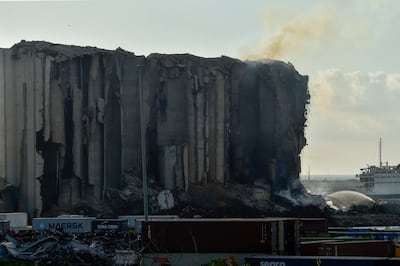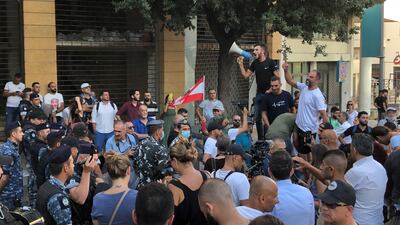Dozens of protesters angered by the severe deterioration in Lebanon’s living standards staged a demonstration in front of the prime minister’s headquarters on Thursday evening.
A handful sat on a road leading to the Grand Serail that was blocked by security forces carrying riot shields.
Some held signs with bread or sunflower oil bottles stuck on, in a reference to the severe shortage of basic goods in Lebanon.
Organisers, many of whom are linked to the nationwide 2019 protests that led to the collapse of the-then government, said they planned to hold similar protests regularly against Lebanon’s various crises and its ruling class.
A devastating economic collapse that first became apparent in 2019 has plunged much of the country into poverty and the local currency has dropped in value by more than 90 per cent.
There are also severe shortages of medicine, water, electricity and other basic necessities.
“The conditions that we're living in are horrendous,” Fouad Debs, from the Depositors Union, told The National. "Everything from inflation, the lack of access to health, to education and increasing poverty.
“All of this is what's making us want to go back out on the streets. And [those in power] are not finding any solutions.”
Political lobbying 'not enough'
Commercial banks in 2019 imposed capital controls on small depositors, barring access to dollars and allowing them only to retrieve their money in Lebanese pounds at hugely reduced rates.
“What we're trying to do is to make people go back on the street,” said Mr Debs. "Because all the work that's being done judicially, politically, lobbying is not enough. And a big part of protesting is to go back on the streets, reclaim public space."
The Covid-19 pandemic and the blast at Beirut’s port in August 2020 that killed more than 200 people has only exacerbated the crisis in Lebanon.
For two weeks, a fire has been burning in a grain silo, which was severely damaged in the explosion that rocked the Lebanese capital.
The fire, which has brought back memories of the traumatic explosion, has been blamed on the summer heat and fermenting wheat in part of the silos.
Authorities have been accused of inaction over the fire.
On Thursday, the smoke coming from the silos thickened, with firefighters and the army on hand to cool the structure.
The government has said a poorly carried-out operation to extinguish the flames meant the silos could collapse.

The silos remain a sensitive topic in Lebanon. The 2020 explosion has been blamed on mismanagement and corruption, and is viewed as a symptom of — but also symbolic of — the country's mounting systemic problems.
In April, the Lebanese Cabinet approved the demolition of the silos after a survey found that they could collapse in the coming months.
But many, including some families of the 2020 blast victims, want the silos to remain as a memorial.
[The silos] are a good reminder of the huge crime that happened,” Mr Debs said. "And it's clear what they [the authorities] want to do. They want to take it down so people will forget. And they want to take it down so this will also hurt the investigation."
An investigation into the port explosion by judge Tarek Bitar has struggled to make headway and has been hamstrung by repeated delays. Two sitting MPs in the Lebanese Parliament have been charged in connection with the investigation but both have refused to attend interrogation hearings.


